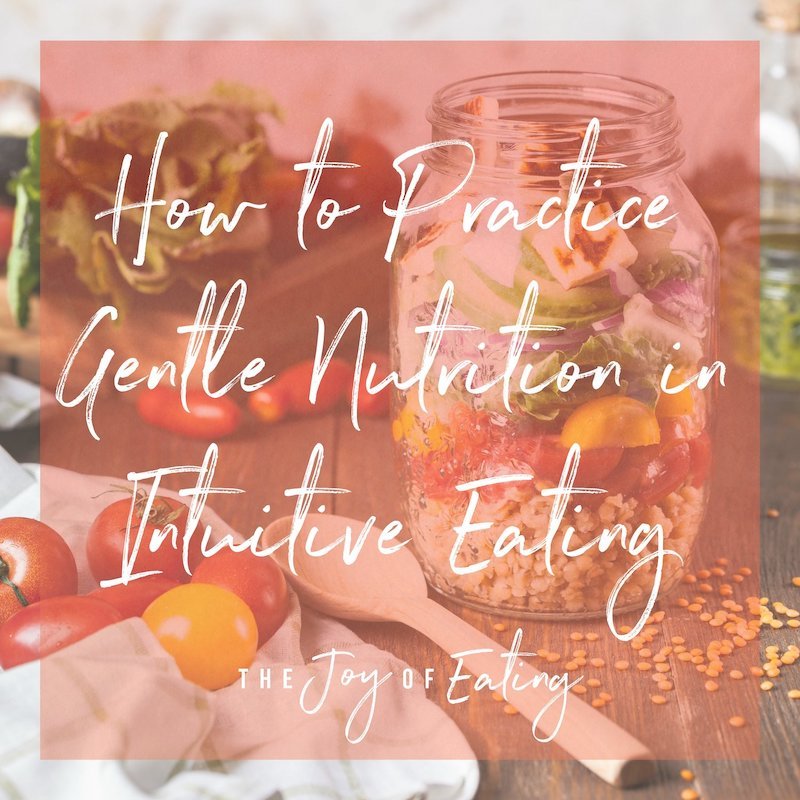Gentle Nutrition or Diet Mentality? How to Tell the Difference
Thanks to the diet industry co-opting wellness, it can be hard to distinguish if a food choice is stemming from gentle nutrition or diet mentality. Read this blog post to explore the difference.
If you’ve been following my work for any length of time, you’re probably aware of the fact that I love to dive into the nuances of intuitive eating. Those areas where people feel stuck or confused or misconceptions and myths arise? Let’s goooo!
My love of nuance is one of the reasons I wrote a whole book on gentle nutrition, arguably one of the most nuanced aspects of intuitive eating. In my experience, understanding some of the complexities of gentle nutrition is one of those things that helps intuitive eating “click” for many people. So as you might imagine, I was thrilled to be invited on Ten Percent Happier podcast to dive into the topic of gentle nutrition with a larger audience. If you're not familar with Ten Percent, it's one of the largest health and wellness podcasts, hosted by former Good Morning America anchor Dan Harris. It was one of those "pinch me" career moments! If you haven’t had a chance to listen, here’s a link. Would love to hear your thoughts!
One of the first topics we dove into was what intuitive eating is, and the difference between gentle nutrition and diet mentality. Because this is an area where a lot of people can get confused, I was happy that this was one of the first topics. When it comes to distinguishing gentle nutrition from diet mentality, of course there are obvious dieting behaviors - no one is confusing the grapefruit diet for gentle nutrition! But these obvious diets aren’t what most people are doing these days, so it usually isn’t quite so clear.
The diet industry has done a pretty solid job rebranding their products and programs as wellness. The most famous (and perhaps hypocritical) example of this was when Weight Watchers relaunched as WW, taking weight out of the name but of course not out of the program. More recently, the MLM Beachbody - you know, the reason your Facebook inbox is flooded with “hey girl!” messages from people you haven’t spoken to in 15 years - has rebranded to BODi, claiming to be a weight inclusive program while explicitly selling programs and products for weight loss.
This move towards marketing “wellness” over weight loss is part of an intentional attempt by the diet industry to stay relevant. “Old school” diet programs like Jenny Craig are shutting down, and marketing studies have revealed that customers are turned off by phrases like “diet,” “low calorie,” and “low fat.” Good news: the message that diets don’t work has hit the mainstream. Bad news: we still live in a super fatphobic culture and therefore people want to lose weight. The diet industry knows this, especially the very well-compensated marketing execs they employ, so weight loss has become more of a * wink wink * with phrases like “wellness,” “healthy,” and “self care” doing the heavy lifting.
Another reason it’s so hard to distinguish gentle nutrition from diet mentality: our cultural moralization around health. While desire for health is pretty normal and understandable (is there anyone out there who actually wants to be sick or diagnosed with a chronic illness?), our culture attaches social capital to it, and demonizes people who are sick. People who are lucky and/or privileged enough to be relatively healthy are upheld as virtuous and something to aspire to. They are assumed to be “doing the right things” and “responsible” caretakers of their body. Conversely, people who are unhealthy (or have been deemed to be unhealthy because of their body size), are assumed to have caused their illness. Or as my friend Shana recently tweeted:
Health has long been associated with affluence and social status, and this has become even more heightened in our social media age, where we can curate the image of health and wellness. When someone posts a picture of themselves going for a workout in trendy and expensive athleisure they gain social capital, regardless of their actual health status or motivation for exercise. When someone decides to eat a “healthy” food or follow a specific eating plan, it genuinely might not have much to do with weight loss. It may have more to do with gaining social capital, performing health, fear of “doing things wrong” and getting sick, or fitting in with people around them. But if there’s shame, restriction and deprivation involved, does it really matter that weight loss isn’t the main motivator?
As you can see, distinguishing gentle nutrition from diet mentality is far from clear cut. When I work with clients on gentle nutrition, we focus on the intentions behind a food choice just as much as the food choice itself. This is where it can get really clear whether a choice is stemming from a genuine desire to improve health and wellbeing, or if diet mentality is driving the decision.
Here’s 6 questions I like to ask:
Gentle Nutrition or Diet Mentality?
Is it for wellbeing or weight loss?
Perhaps the most important question in distinguishing gentle nutrition from diet mentality. Sometimes the answer to this question is clear, other times less so. If the latter, I’ll often follow it up with questions like:
If you knew you wouldn’t lose a pound, would you still make this change?
If making this change made you quantifiably healthier, but resulted in a small amount of weight gain, would you still make this decision?
If I totally and completely accepted my here-and-now body, would I still make this choice?
Is the change rigid or flexible?
Any dietary change made to improve wellbeing must be flexible enough to allow you to live life in a way that feels good to you. There may be some exceptions - if you have a severe allergy, celiac, or similar, clearly there may be times your dietary needs impact life. But for the most part, there are very few medical conditions with dietary needs that don’t allow for flexibility. This is especially true when it comes to pursuit of general health and wellbeing. I repeat, there is no need for rigid food rules or strictly eliminating foods/food groups if your goal is to improve general health. For most medical conditions, it’s the same.
Is it for self care or self control?
When you think of the intention of the food choice, is the focus on caring for your body, or trying to control it? This may feel like an odd exercise, but when you think about making the change/decision, consider what kind of parent you connect with. Does it feel like it’s stemming from an authoritative parent, or a nurturing one?
Is it individualized or one-size-fits-all?
Think about the diet and nutrition books you’ve read or programs you’ve followed. Most, if not all, prescribe one-size-fits-all advice. Everyone reading the book is told to do the same thing, no matter their individual food and nutrition needs, food preferences, lifestyle, activity levels, medical conditions, etc. Gentle nutrition should always be adapted to you and your individual needs and wants.
Is it focused on adding or subtracting?
Gentle nutrition is usually focused on adding nutrition in, while dieting is focused on taking foods out. Dietitian Paige Smathers has coined the phrase positive nutrition, and I really like that phrase. This aligns with my nutrition hierarchy of needs, which posits that eating enough food is the most important aspect of nutrition.
Is it focused on the big picture or individual meals and snacks?
Diets typically micromanage individual meals and snacks, trying to get them to fit into their rigid ideal or rules. Gentle nutrition zooms out on eating patterns over time and focuses on making changes that impact the big picture. Here’s an example of how a diet and gentle nutrition might approach the same general goal: eating more fruits and vegetables.
Diet: Eat X servings of fruits and X servings of vegetables every day
Gentle nutrition: Come up with a list of 4-5 snacks you actually like that also include produce, and try to have at least a couple of those around at all times (sidebar: I’m currently obsessing over sweet and savory cottage cheese snacks, like cottage cheese with mango and honey and cottage cheese with diced cucumbers, a drizzle of olive oil, and salt).
Still not sure if it’s gentle nutrition or diet mentality?
It’s OK if you’re not sure! These things can be hard to untangle. The cool thing about intuitive eating is that there’s no such thing as a mistake, but there are learning opportunities. What would it be like to go with your gut, and get curious afterwards about how the decision felt? Did you feel deprived and restricted, or did you notice backlash eating behaviors later on? If so, that’s a sign that the decision may have been stemming from diet mentality. Maybe it felt very chill, like the choice was no big deal, or you felt nurtured and cared for. If so, it’s a sign that it was gentle nutrition. Remember, your experiences with food give you helpful info for the next time.
If you’re interested in learning more about gentle nutrition and how you can integrate in your life, we work with clients out of our Columbia, SC office and virtually. Read more about our nutrition philosophy and reach out if you’d like to get more information.







